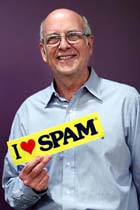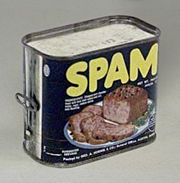Got Spam? Thank Gary Thuerk.
Who is Gary Touerk?
Gary Twurk is the parent of the Internet plague. The Los Angeles Times called him the father of spam ("Father Of Spam").

In 1978, he sent 400 letters to his potential customers. The mailing was done through the US state network ARPAnet , which was the ancestor of the Internet. Gary worked as a sales manager in the now defunct corporation DEC .
Short excursion
Digital Equipment Corporation ( DEC ) is an American computer company founded in 1957 by Ken Olsen and Harlan Anderson .
The initial capital of the company was $ 100,000, with 70% owned by American Research and Development Corporation . The parent company insisted that the name of the subsidiary did not contain the word “computer” , although the name was originally planned as “ Digital Computer Corporation ”. The same condition was observed in the product name: instead of the term “computer” , the term “Programmable Data Processor” was used , or abbreviated as “PDP” . This condition was due to the fact that in those days there was a stereotype, that the computer is something huge and expensive, requiring a separate machine room and a solid staff. In this way, the company avoided the negative consequences of this stereotype. In 1998, Compaq bought the financially troubled Digital Equipment Corporation . The most well-known DEC products are the PDP minicomputer series, the VAX series, the DEC Alpha microprocessors.
Originally, the word “SPAM” appeared in 1936. It was decoded as SPiced hAM (spicy ham) and was a trademark for canned meat from Hormel Foods , spicy sausage minced pork.
The term SPAM has received worldwide fame for annoying ads due to the famous sketch of the same name from the famous Monty Python Flying Circus show (1969) by the comic group Monty Python . The meaning of the sketch is that in one cafe all the dishes on the menu contain " SPAM ", some even several times. When the main character of the sketch, who came to this cafe with his wife, asks him to bring him a dish without " SPAM ", the waitress offers him a dish with "a small amount of SPAM ". The visitor is indignant, and the choir of the Vikings, who are sitting at the adjacent tables, begins to sing the praise song " SPAM ", after which the sketch plunges into chaos. At the end of the sketch, the hero's wife exclaims: I do not like “SPAM” ! (eng. " I don't like spam! "). In the credits, the word " SPAM " was also added to the names of the characters. In total, this word is mentioned in the sketch more than a hundred times .
In a letter, Gary tried to acquaint users with new technical developments of his company. It also contained an invitation to attend one of the two presentations. The reaction to these advertisements was not long in coming. Even the Communications Department of the US Department of Defense , which was in charge of the ARPAnet network, intervened . It forbade him to repeat this marketing ploy. Despite the ban, Türk believed that the idea was great, in it he saw the possibility of cheaply informing a huge number of people by those standards (in principle, by today's standards you know yourself, and if not, ask Google).
Gary is proud that he became the first spammer (it seems that he even got into the Guinness Book of Records!), He puts himself on a par with such types as the Wright brothers (who built just an airplane,
Here is a part of that interview (the translation immediately speak very, very “literary”, but I think it’s understandable :)
- J .: Who really came up with the idea of mass emailing?
GT: I. I looked at the number of people we wanted to notify about our know-how and realized that sending out invitations and personal calls would take a lot of time ( and time is money :) Well, we decided to send all my soap and soap . - J .: Well, what was the reaction ?!
GT: Yes, the most different! Starting from gratitude for valuable information, ending with direct threats against me. - J .: Is it true that your action was very effective?
GT: She was very effective. After a presentation in Los Angeles and Silicon Valley, we earned between $ 10 million and $ 12 million over the next few years. - J .: Were you pleased with the result you achieved?
GT: Yes, I accepted it with great enthusiasm, but the Department of Communications of the Ministry of Defense forbade me to repeat such tricks. - J .: What were the reasons for this ban by the Communications Department of the Ministry of Defense ?
GT: Well, in general, they said that ARPAnet is not intended for commercial use. If someone at that time wanted to create for example Amazon , they wouldn’t be allowed, either, but everything changed when ARPAnet became public. - J .: Did you spam after the warning?
GT: No Mass mailings we no longer committed. Single were, and those only at the request of customers. - J .: What was the mass mailing called then?
GT: She was not called SPAM . It was called junk correspondence. - J .: How do you know that you are the first spammer ?
GT: It's simple. At that time, all information was only online, and there were no refutations. - J .: How do you feel about your nickname?
GT: With humor. Sometimes I say to someone: " Do not make me angry! I am the first Spammer !!! "
Interview Source
PS If anyone is interested, here is the text of the letter, the addresses of the recipients and some texts of the answers (in English, of course)
')
Source: https://habr.com/ru/post/27347/
All Articles
